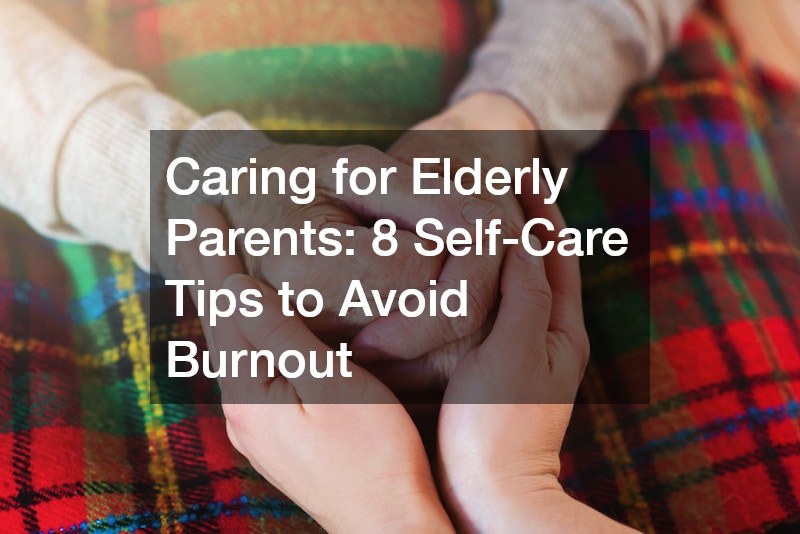
Caring for elderly parents can be one of the most rewarding yet challenging experiences. While ensuring the well-being of your loved ones is essential, it’s equally important to take care of yourself. Caregiver burnout is a real risk, and without adequate self-care, you may find yourself overwhelmed, physically drained, and emotionally exhausted. Below are eight self-care tips to help you manage the demands of caregiving while keeping your well-being in check.
1. Prioritize Your Own Health
It’s easy to neglect your health while focusing on your parents’ needs, but taking care of your own body is critical for effective caregiving. Make time for regular exercise, even if it’s just a short 20-minute workout or walk.
Exercise helps reduce stress, improves mood, and boosts energy levels.
Also, make sure to eat a balanced diet, get enough sleep, and schedule your own medical check-ups. Remember, you can’t care for others effectively if your health is deteriorating.
2. Practice Mindfulness and Stress Management Techniques
Mindfulness practices such as meditation, deep breathing exercises, and yoga can help reduce stress and anxiety. Even spending five minutes each day focusing on your breath or clearing your mind can have significant benefits.
Consider integrating relaxation techniques like guided imagery, progressive muscle relaxation, or journaling into your daily routine. These activities can provide a sense of calm and mental clarity, which is essential for coping with the emotional ups and downs of caregiving.
Stress management is crucial for your long-term well-being and can help you maintain a more positive attitude while caring for your parents.
3. Accept Help and Delegate Tasks
Don’t hesitate to ask for help. Whether it’s from siblings, extended family, friends, or professional caregivers, delegating tasks can greatly lighten your load.
For example, you might take charge of medical appointments while someone else can handle grocery shopping or house maintenance. If you have siblings, discuss ways to share responsibilities.
Caregiving should not fall entirely on one person’s shoulders. Hiring a part-time caregiver for assistance with daily activities can also give you much-needed breaks to focus on your own well-being.
4. Take Breaks and Practice Respite Care
Continuous caregiving without breaks can lead to physical and mental exhaustion. Schedule regular breaks for yourself, whether it’s a short walk, a lunch out with friends, or even a day off to recharge.
Consider respite care services, which can provide temporary relief by having someone else care for your loved one for a set period of time. This could mean utilizing care homes for short-term stays or hiring a caregiver to come into your home.
Respite care can be a few hours, a weekend, or even longer, giving you the opportunity to refresh and return to caregiving with renewed energy.
5. Find Emotional Support
Caregiving can take an emotional toll, especially when watching your parents’ health decline. Finding emotional support is crucial to avoid feelings of isolation and frustration.
Connect with other caregivers through support groups, either in-person or online. Sharing your experiences with people who understand your challenges can provide comfort and practical advice.
You can also seek professional counseling or therapy if you feel overwhelmed. A licensed therapist can help you work through your emotions and develop coping strategies for the stress and anxiety that often come with caregiving.
6. Establish Boundaries
Creating boundaries between your caregiving duties and personal life is essential for maintaining your mental health. It’s okay to say no sometimes. If a task is beyond your capability or time limit, politely decline or suggest an alternative. Establishing these boundaries will prevent you from overextending yourself and ensure that you still have time for your own hobbies, relationships, and self-care.
7. Stay Organized
The multitude of caregiving responsibilities can be overwhelming, from managing medications and medical appointments to handling finances. Staying organized can help reduce stress and give you a sense of control.
Use calendars, apps, or planners to track appointments, medications, and important documents. Many caregivers find that setting reminders for important tasks reduces the mental burden of remembering everything.
Additionally, create a support system with other family members or friends to help keep things running smoothly.
8. Simplify Your Life
Focus on what truly matters on your caregiving journey. Let go of non-essential tasks and activities that can create unnecessary stress and pressure. By simplifying your life, you can devote more time and energy to enjoying quality moments with your parents.
Whether it’s sharing a meal, watching a favorite show together, or simply having a heartfelt conversation, prioritizing these moments can deepen your bond and enhance your overall caregiving experience.
Final Thoughts
Caring for elderly parents is a challenging role that requires emotional resilience, patience, and dedication. However, it’s crucial to recognize that taking care of yourself is not selfish—it’s necessary. Without proper self-care, the risk of caregiver burnout increases, and that can ultimately affect both you and the loved ones you’re trying to support.
Implementing the self-care strategies outlined above will help you maintain balance, reduce stress, and preserve your health. By prioritizing your own well-being, you can continue to provide the best possible care for your elderly parents, ensuring that you’re not only a caregiver but also a happy, healthy individual.
.

